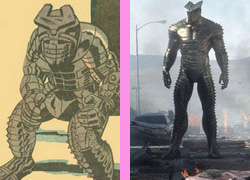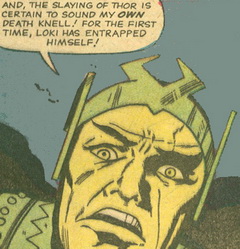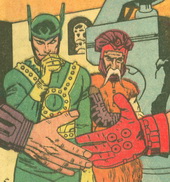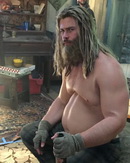
Published: July, 1965
Script: Stan Lee
Pencils: Jack Kirby
Inks: Vince Colletta
Letters: Artie Simek
“The Crimson Hand!”
Script: Stan Lee
Pencils: Jack Kirby
Inks: Vince Colletta
Letters: Sam Rosen
Literature is awash with folks finding a magical means of having their wishes granted, only to discover that getting what they most desire is not necessarily what’s best. Remember King Midas from Greek mythology? How about The Monkey’s Paw, by W.W. Jacobs? Hans Christian Anderson had his Galoshes of Fortune, and Aesop The Old Man and Death. And of course, let’s not forget the big daddy of all wish-granters, the genie in Aladdin’s lamp. Fast forward to the movies of the 20th century, where Tom Hanks wishes to be Big, George Burns wants to be 18 Again, and Judge Reinhold opts for a little Vice Versa. None of it with the expected results.
About the same time that Journey Into Mystery #118 hit the newsstands, television was discovering what hilarity might ensue when wishes are granted with a blink of the eye or twitch of the nose, with I Dream of Jeannie, and Bewitched.
Though I have yet to run into any Marvel characters that can actually grant wishes, I have seen the unfortunate results of Marvel characters getting what they think they want.
Turns out Unus the Untouchable could not even touch his pack of Marlboros in X-Men #8, and went through some nasty nicotine withdrawal symptoms. And then there’s the Mad Master of Time, who, in Tales to Astonish #43, in revenge for his employer’s age discrimination policies, creates a ray gun that ages everyone, but he accidentally uses it on his beloved grandson.
In “To Kill a Thunder God,” it strikes me that almost every character is wishing for something, but hasn’t thought through the consequences. And in the accompanying Tales of Asgard, the Crimson Hand serves a magical means of getting what we all think we want: the truth. But sometimes what we want, what we wish, isn’t what we actually need.
THE HUNTER WISHES FOR TREASURE
 Let’s start with the Hunter from To Kill a Thunder God. Loki introduces this pivotal but two-dimensional character as having a “heart filled with greed.” That’s all Loki knows about him; that’s all we need to know about him. So what does the Hunter wish for? (Personally, I think he should have wished for a less conspicuous outfit in the dangerous jungle, perhaps something in a subdued olive green rather than bright yellow? But that’s beside the point…) Because the Hunter’s heart is filled with greed, he becomes fixated on the “King’s Ransom” he can get from turning in the Thunder God that Loki has conveniently dropped in his lap. His desire for riches blinds him to the danger of Loki’s valuable but magical items mysteriously showing up out of nowhere, and he lets himself be pulled right into the Temple of Darkness, where his spirit is captured by the Destroyer.
Let’s start with the Hunter from To Kill a Thunder God. Loki introduces this pivotal but two-dimensional character as having a “heart filled with greed.” That’s all Loki knows about him; that’s all we need to know about him. So what does the Hunter wish for? (Personally, I think he should have wished for a less conspicuous outfit in the dangerous jungle, perhaps something in a subdued olive green rather than bright yellow? But that’s beside the point…) Because the Hunter’s heart is filled with greed, he becomes fixated on the “King’s Ransom” he can get from turning in the Thunder God that Loki has conveniently dropped in his lap. His desire for riches blinds him to the danger of Loki’s valuable but magical items mysteriously showing up out of nowhere, and he lets himself be pulled right into the Temple of Darkness, where his spirit is captured by the Destroyer.
By wishing so fervently for treasure, the Hunter has lost his greatest treasure, which he never appreciated when he had it—mind and body united as a single entity, rather than fragmented as a captive of a massive hunk of metal, and useless physical junk doomed to stand around in that gaudy yellow shirt for the rest of eternity.
ODIN WISHES TO PROTECT EARTH
But now we come to the Destroyer. Eons ago, Odin created this secret weapon and placed it on Earth as an insurance policy against some future time when we Midgardians might need a helpful Asgardian hand to get out of a pickle. As head of a superior race, no doubt Odin felt it his responsibility to protect those less fortunate and less competent from all the great dangers out there in the universe. What a swell guy!
FIRST IMPRESSION
 When I first met the Destroyer in the first Thor movie, I had no idea who he was, and don’t even remember if anyone called him by name. Having now met him in the comics, though he looks nowhere near as impressive in these muddy 1965 illustrations as he does in the MCU, learning more about his capabilities, I’ve gained an even greater respect for him.
When I first met the Destroyer in the first Thor movie, I had no idea who he was, and don’t even remember if anyone called him by name. Having now met him in the comics, though he looks nowhere near as impressive in these muddy 1965 illustrations as he does in the MCU, learning more about his capabilities, I’ve gained an even greater respect for him.
Seriously though, I’m certain Odin’s intentions were good when he hid the Destroyer in the Temple of Darkness, but I don’t think this head of a superior race really thought it through all the way.
What was the plan for activating the Destroyer? Why make the Destroyer “unbeatable”? Did Odin not realize how badly this could go astray? Only HE has the power to stop the Destroyer. Not even Thor can do it. And for such a powerful weapon that appears capable of destroying everything in its path, it does not appear to be a well-guarded secret in Asgard.
Loki knows about it. Thor has heard about it. Who else? Do ALL Asgardians know the power and the location of the Destroyer? Do the Executioner and the Enchantress? Perhaps not, or surely we would have seen them seeking and using it already, or at the very least, using their magic to try to track it down.
Okay, so maybe it’s just a family secret, known only to Odin and the boys. But here’s another problem. Let’s go back to Odin including in the specs for this magnificent machine that it is unbeatable by any one but himself. Yet, Odin is fully aware that once a year he must spend an entire day immersed in the ritual of “the sleep of life” in order to maintain his immortality.
When Odin set up the Destroyer in the Temple of Darkness, did he never consider what might happen if, on the one day he is OoO, unable to be awakened, that is the exact time something goes wrong with the Destroyer? And did it not occur to Odin that, should that happen, he would go down in history not as the great savior of us poor helpless Midgardians, but as much our destroyer as the actual Destroyer?
Why was there no “Plan B”? Jeez! Even Broadway actors have understudies!
 LOKI WISHES TO STOP THOR
LOKI WISHES TO STOP THOR
And then there’s Loki, who has set all the events of this issue into motion. He preyed upon the renegade hunter’s greed and easily manipulated him into capturing Thor before the magic stones could be discovered. But Loki quickly realizes he may have gone too far. “For the first time I have outsmarted myself!” he says, pondering the stupidity of his actions. And later he laments, in true villain third-person style, “For the first time, Loki has entrapped himself!”
I absolutely LOVE that Loki finds himself in this position. His own greedy desire to thwart Thor caused him to act first, think later. He didn’t need a Jeannie to mess things up for him.  In this scenario, he is both the playful Jeannie and the hapless Tony Nelson who must live with the consequences of having a genie in his life.
In this scenario, he is both the playful Jeannie and the hapless Tony Nelson who must live with the consequences of having a genie in his life.
He was able to do all that completely on his own, thank you very much! And I get so much enjoyment out of watching the mischievous Loki squirm under the potential consequences of his own ill-thought actions. Of course, by the end of this story nothing is resolved, and knowing Loki, he will yet find some way to squirm right out of all his troubles. But, ah…. this moment is so satisfying!
WISHING FOR THE TRUTH
Conveniently, for the purposes of writing this post, it turns out that the accompanying Tales of Asgard story touches on the same theme of being careful what you wish for.
In the previous Tale, the oversword was found to have a crack, which could lead to annihilation, unless Odin finds out who did it. So it seems a major MAJOR problem needs to be solved, or the entire universe may be subject to ultimate peril.
So what does Odin do in this most dire of all circumstances? Send out his highest ranking military might and minds? Engage Asgard’s greatest seers and scientists? No, he calls for his two squabbling sons, entrusting them with the fate of the entire universe.
This, of course, makes no sense at all. Unless…there’s something I don’t know? Part of me wants to give Odin the benefit of the doubt and believe that perhaps this crack in the oversword is not really such a big deal after all, but he’s telling his sons that it is, because he needs to give them a project they can work on together, in hopes that somehow they will learn to get along. Is this nothing more than a test to help Thor and Loki overcome their sibling rivalry? If that’s the case, then massive points for Odin for handing them the ultimate challenge. But if this is a REAL issue, then no points for Odin, who is entrusting the fate of the entire universe to a couple of babies.
But that’s all beside the point. The “be careful what you wish for” aspect of this story is that as Thor and Loki are about to set out on this awesome task, magician Morduk, the medieval comic book version of James Bond’s Q, provides Thor with a truth-telling device known as the Crimson Hand. The thought here obviously is that it’s always a good thing to know the truth. We all wish to know the truth, don’t we?
Well…don’t we??
Of course, as literature and Hollywood tell us, there is no end of trouble, when a magical device compels one to tell the truth, such as Fragarach, the mystic sword of Nuada, from Irish mythology. We sometimes see this played for comic effect in movies like Liar, Liar with Jim Carrey. And though this is a blog about Marvel, I can’t help but mention what happens in the DC universe when Aquaman unknowingly sits on Wonder Woman’s lasso of truth.
Sure, Thor uses the Crimson Hand to root out the treachery of Loki’s chosen assistant, Braggi, which is a huge boon for the mission, even before it gets started. But when Loki recognizes the power of the Crimson Hand, he meets Thor’s “Hey bro, come over here and let’s have a nice handshake before we set out to save the universe,” with “Sorry bro, maybe later…a bit busy at the moment!”
 This alone should be a moment of concern for Thor. How should he proceed? A more reasonable, less headstrong leader would interpret this moment as one of danger for the upcoming mission and cut Loki from the roster. But Thor only muses, “I must be ever on guard against my scheming half-brother!” He wishes and believes he has the power to keep Loki in check, but if he’s wrong, it could spell disaster. Again, he isn’t thinking through to the potential consequences.
This alone should be a moment of concern for Thor. How should he proceed? A more reasonable, less headstrong leader would interpret this moment as one of danger for the upcoming mission and cut Loki from the roster. But Thor only muses, “I must be ever on guard against my scheming half-brother!” He wishes and believes he has the power to keep Loki in check, but if he’s wrong, it could spell disaster. Again, he isn’t thinking through to the potential consequences.
So it appears that even after everything that has happened between these two, Thor is still willing to give Loki another chance. He knows, in his heart of hearts that Loki is no good. He knows Loki is trouble. (After all, it’s right there in the small print after his name: God of MISCHIEF…??) But Thor doesn’t want to deal with this truth—not only that Loki is no good, but more so, the truth that the mighty Thor might not actually be capable of containing him. Like so many of us, he THINKS he wants to know the truth, but when it comes right down to it, he can’t handle the truth.
I’m wondering how this mission to discover the source of the crack in the oversword is going to turn out, when clearly one of the main people on the team to save the universe is not as nobly motivated as the other.
 I also wonder what eventually happens to this magical and powerful Crimson Hand. Does it survive the ravages of time? And should Thor one day take the Crimson Hand to earth and give Jane Foster a friendly pat on the behind as he asks, “Hey honey, do these large buttons on my costume make me look fat?” will he perhaps not be pleased with her reply?
I also wonder what eventually happens to this magical and powerful Crimson Hand. Does it survive the ravages of time? And should Thor one day take the Crimson Hand to earth and give Jane Foster a friendly pat on the behind as he asks, “Hey honey, do these large buttons on my costume make me look fat?” will he perhaps not be pleased with her reply?
| Want to read this comic on your computer? Marvel has a scan! Want to own the story? Buy the Masterworks! |














